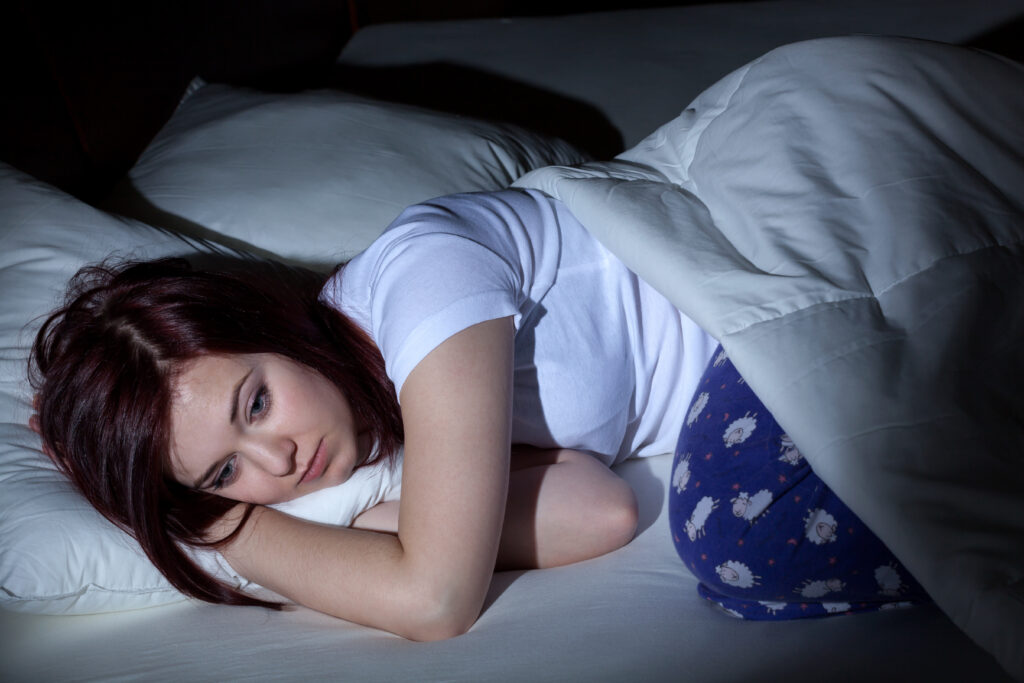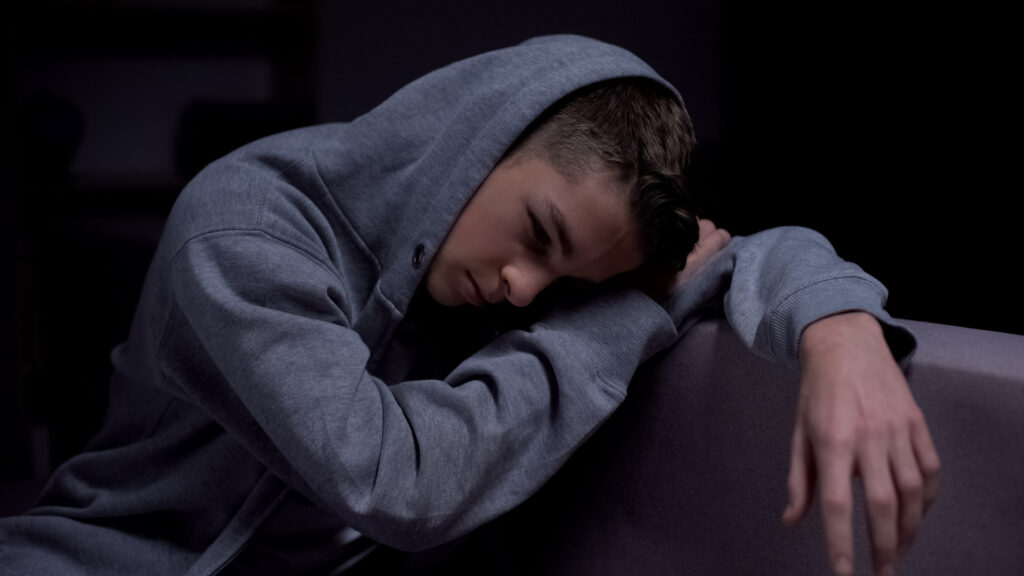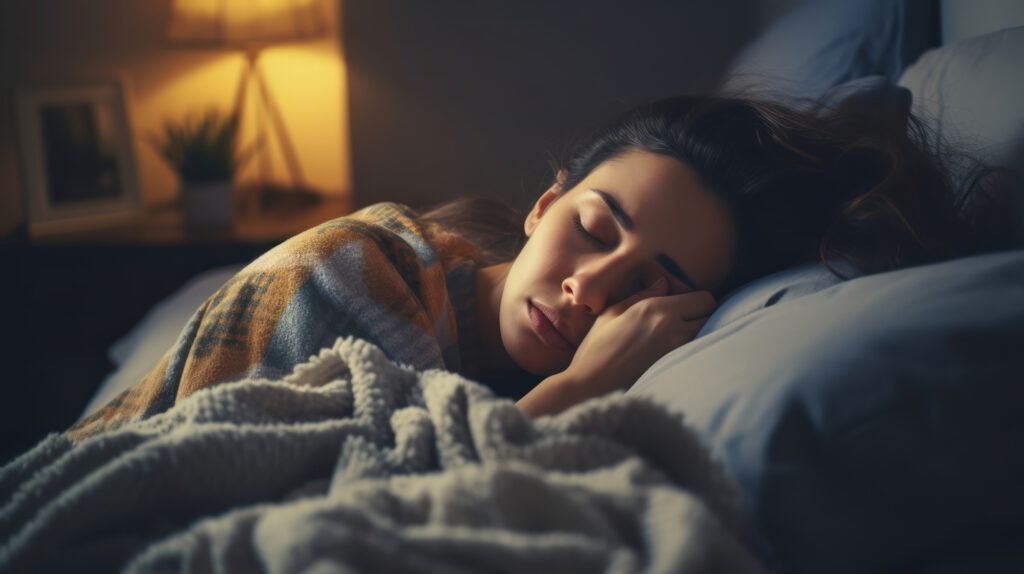Many kids have trouble sleeping now and then. But if your child doesn’t outgrow their sleep struggles, they may be at higher risk of mental health disorders like depression and anxiety.
New research shows the importance of identifying and addressing insomnia in children as early as possible. Children with insomnia symptoms that persist into young adulthood are almost three times more likely to have depression, anxiety, and other mental health disorders, according to a 15-year study conducted by the American Academy of Sleep Medicine. About 40 percent of children in the study didn’t outgrow their trouble falling or staying asleep.
Children whose symptoms improved over time weren’t at greater risk of mental health disorders as young adults. Researchers concluded that by intervening early, parents may be able to help prevent future mental health problems due to childhood insomnia.

A Bi-Directional Relationship
The study aligns with previous research showing childhood sleep problems and mental health disorders are intertwined and can make each other worse. The relationship goes in both directions:
- Sleep deprivation can bring on mental health symptoms like impulsivity, negative thinking, and suicidal thoughts. This underscores the importance of good sleep hygiene in adolescence.
- People with mental health disorders are more likely to have insomnia and other sleep disorders.
- Chronic sleep disturbances affect more than half of psychiatric patients.
Why Is Sleep Important for Mental Health?
Although the underlying mechanisms are complex and still under research, sleep does several important things for our brains and bodies. Getting a consistent, healthy amount of sleep every night can:
- Boost immune system functioning
- Enhance learning and memory
- Contribute to emotional health
- Regulate stress hormones and other brain chemicals

Mental Disorders Commonly Associated With Sleep Problems
Research links childhood insomnia with a wide range of mental health disorders, including:
- Depression
- 90% of adults and children with major depression have some type of sleep problem. The most common sleep issues are insomnia and obstructive sleep apnea.
- Sleep problems also increase the risk of depression. One study found those with a history of insomnia were four times as likely as normal sleepers to develop major depression. Depressed individuals who experience insomnia are less likely to respond to treatment and are at greater risk of relapse.
- Bipolar disorder
- 99% of people with bipolar disorder experience insomnia or less need for sleep during a manic episode. Others report excessive sleep.
- Anxiety
- Sleep problems are common in people with generalized anxiety disorder, post-traumatic stress disorder and other types of anxiety. Common symptoms in adolescents include taking longer to fall asleep and sleeping less deeply than most kids.
- Attention deficit hyperactivity disorder (ADHD)
- 50% of kids with ADHD have trouble falling asleep or getting restful sleep. Other common problems are sleep-disordered breathing and restless legs syndrome or other movement disorders.
Clearly, there is a link between childhood insomnia and mental illness.
Symptoms of Sleep Problems in Teens
Since adolescents often stay up late and oversleep, it can be difficult to know if a teen has a sleep disorder. Look for symptoms like:
- Refusing to go to bed or keep a regular sleep schedule
- Struggling to fall or stay asleep
- Feeling tired or falling asleep during the day
- Waking frequently during the night
- Trouble getting up in the morning
- Irritability or difficulty concentrating
- Behavioral problems such as impulsivity, aggression, hyperactivity, or defiant behavior
What Causes Insomnia in a Child?
Childhood insomnia can be triggered by a range of factors. Stress from school or family issues, anxiety, and changes in routine or environment can all contribute to childhood insomnia. So can medical conditions such as asthma or allergies and mental health disorders like depression or ADHD. Excessive screen time before bed and poor sleep hygiene habits can also potentially contribute to childhood insomnia. Remember: it’s crucial to intervene as soon as possible if your child is showing signs of sleep struggles.

How to Help a Child With Insomnia
Treating sleep issues in children can help alleviate mental health symptoms. There are several approaches that can help with both sleep and mental health, starting with these:
- Lifestyle changes such as exercise and limiting sugar and caffeine at night
- Meditation or other relaxation practices
- Healthy sleep habits, including:
- Keeping a consistent schedule
- Leaving screens off or outside the bedroom
- Maintaining a bedtime relaxation routine
- Therapy and medication (if needed)
If your child shows signs of a sleep disorder, please consult your family physician. For some teens, sleep issues can be a sign of a medical concern or medication issue. Since sleep disorders often go hand in hand with mental health issues, consider talking with a counselor, therapist, or psychiatrist as well. Approaches like cognitive behavioral therapy (CBT) can help with both sleep disorders and mental health conditions. With help, your child can set up healthy sleep habits now that will support their physical and mental health for years to come.
Frequently Asked Questions About Childhood Insomnia and Mental Illness
What are the potential consequences of untreated childhood insomnia?
Untreated childhood insomnia can lead to a range of negative outcomes, including impaired cognitive function, academic difficulties, behavioral problems, emotional dysregulation, poor social functioning, and an increased risk of developing mental health disorders later in life.
How can parents recognize if their child is experiencing insomnia?
Recognizing the signs and symptoms is the first step in knowing how to help a child with insomnia. Signs of childhood insomnia may include difficulty falling asleep, frequent nighttime awakenings, resistance to bedtime routines, excessive daytime sleepiness, irritability, mood swings, poor concentration, and impaired academic or social performance.
When should parents seek professional help for childhood insomnia?
Parents should seek professional help if their child’s insomnia persists for more than a few weeks, significantly impacts their daily functioning or quality of life, or is accompanied by other concerning symptoms such as mood changes, behavioral problems, or physical health issues.
Can childhood insomnia be prevented?
While not all cases of childhood insomnia can be prevented, parents can promote healthy sleep habits and routines from an early age to reduce the risk of sleep disturbances. This includes establishing consistent bedtime and wake-up times, creating a calming bedtime routine, ensuring a comfortable sleep environment, and modeling healthy sleep behaviors for their children.
